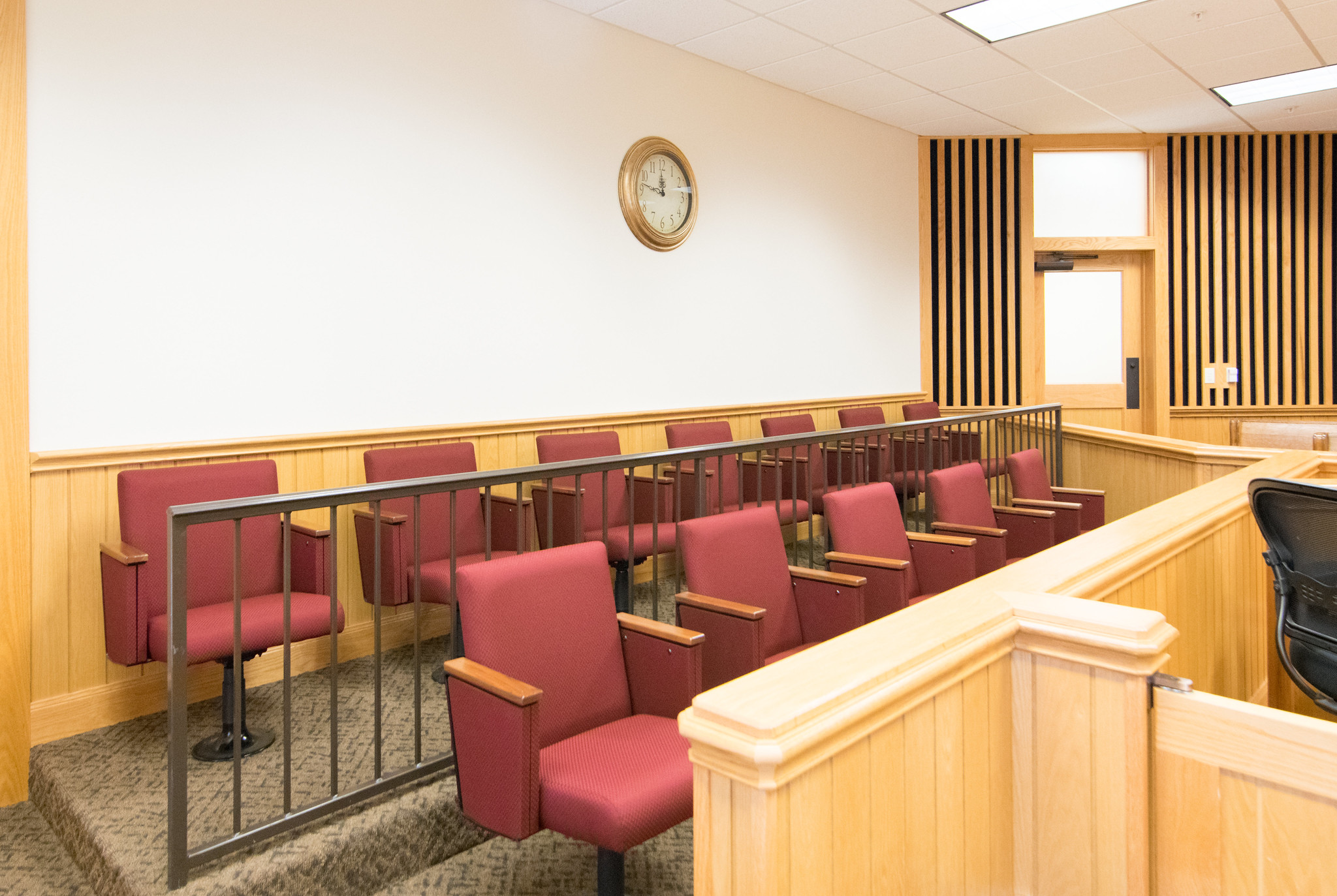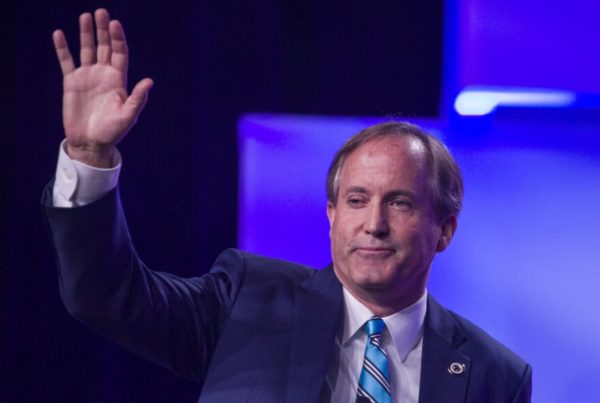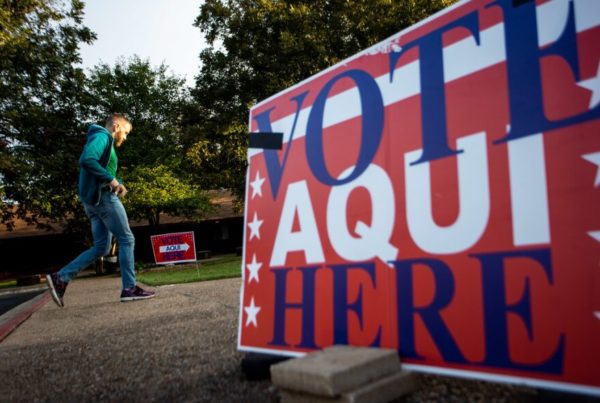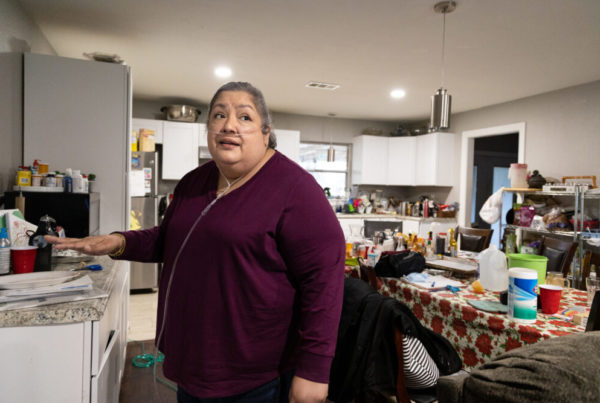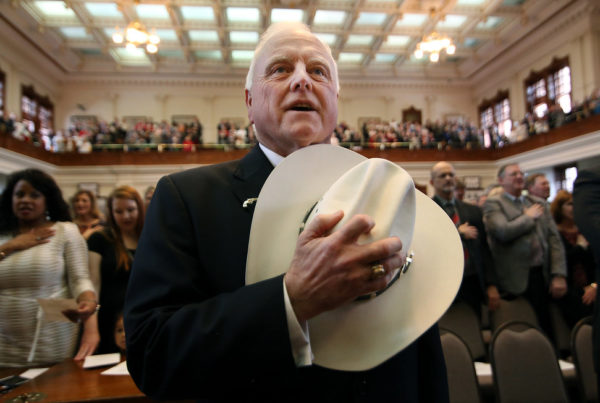In a grand jury room in Dallas, there’s a sign facing witnesses that says, in bold letters, “Do Not Mention Race While Testifying.” For witnesses hoping to share their stories as victims of police brutality during the 2020 protests after the murder of George Floyd in Minneapolis, this sign was a surprise that left them feeling unable to speak fully about their experience.
Miles Moffiet, an investigative reporter for The Dallas Morning News, tells Texas Standard the sign has likely been there, off and on, for decades. Moffiet has been following the journey of Jantzen Verastique, one of the witnesses who has testified to a grand jury about the police violence. He says since grand jury procedures are supposed to be kept secret, Verastique risks contempt of court charges from speaking about this sign.
Listen to the interview with Moffiet in the audio player above or read the transcript below to learn more about the origin of the sign and how it affects witnesses’ ability to give accurate testimony.
This interview has been edited lightly for clarity.
Texas Standard: Grand juries in Texas, just to be clear, these are these are secret, right? Everything in the room has to stay in the room. So how did you find out about this sign?
Miles Moffiet: We’ve been tracking Jantzen Verastique’s experience from the the day that she and her friend were witnessing police brutality during the George Floyd protests. They had seen Dallas police officers ambush a group of peaceful Black protesters, and when Jantzen shouted at them to stop, one of them turned around and fired pepper balls into her breast. And he essentially arrested her and other witnesses at the scene, including the photographer who captured his violence.
So we’ve been tracing that since May 30, 2020, her passage through the justice system and it’s been a twisted turn for them along the way because they’ve encountered secrecy from the police quietly dropping a case against [Dallas police Sgt. Roger] Rudloff, the officer. And then once it gets into the the grand jury room, yeah, no advice whatsoever on how to testify. And once they step into the witness box, they see a sign that says you cannot mention race, and race is very much a part of the truth of their experience that day, and they take an oath to tell the truth.
How did they go about giving testimony if they’re not able to talk about race, per that sign?
That’s the very issue. I mean, again, race imbued so much of their experience that you had mass historic protests in the days after George Floyd’s murder. This is a woman who is Latina. She adopted two Black baby boys, and she was very much worried about their future. That’s why she joined the protests. And Dondi Morse, her friend, also joined her, and they were out there for that very reason.
Race is at the center of their motivation, and then they witnessed police ambush peaceful Black protesters. So when they step into the witness stand, they had not even been advised about this sign, and suddenly they’re tongue-tied. And Jantzen said, “To be honest, I’m not sure how to answer these questions if I can’t refer to race.“
What does the current district attorney’s office have to say about this sign? How do they explain its purpose?
Well, it needs to be said that it took us weeks to get any response from the DA’s office about this. As soon as Jantzen and Dondi shared their experiences with us – at risk of contempt of court charges because they believed that it was so egregious – we had been trying to reach the DA. He finally called me a couple of weeks ago and he basically did his own research into this and said, you know, I didn’t know it existed, but what I found was it’s been up, off and on, for years, even decades.
And, you know, when I explain their experience, he said, you know, maybe we need to take a new look at this, maybe bring the sign down. Ultimately, he’s saying that it’s going to stay up in some cases where they believe race is not an issue. But how you distinguish between those cases is a huge question. So there’s a lot of questions still lingering.
What are you hearing from people who are not directly involved – legal experts, civil rights advocates?
They’ve never heard of it. The director of the National [District Attorneys] Association said that the only admonishment that we’re aware of is, Don’t lie; tell the truth, not, Don’t say anything about race. You’re removing a whole subject matter from the grand-jury proceedings, and when you do that, you remove the grand jury’s ability to really analyze the case.
Let’s say an officer brings in an arrest and starts describing who is arrested. But if he’s not allowed to speak about the race, then how are you to determine whether he’s racially profiling?
So what’s next? It seems like there’s a possibility at least of some kind of lawsuit being filed regarding this sign.
Jantzen Verastique and her civil-rights attorneys have filed what’s called a Rule 202, which will allow them to depose members of the DA’s office as well as police officials, and that would be the basis for a civil-rights lawsuit here in coming weeks.


